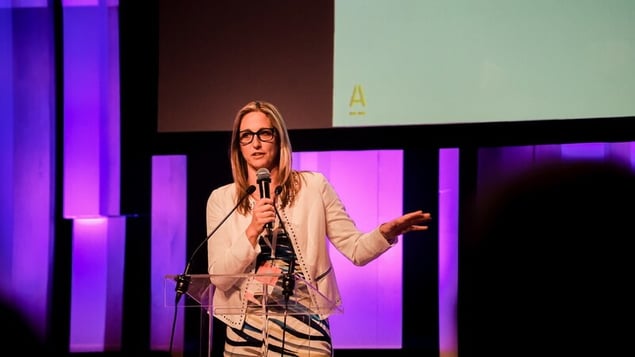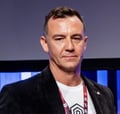Innovation in the Real Estate Market
The often still intangible ESG received its own section at the Proptech Innovation Now conference held on May 16, 2024. Although the EU (and the planet) is slowly presenting the bill for sustainability, most companies still don’t know how to get started.
“Everything can be done half-heartedly,” said ESG consultant Szilvia Bősze in a sharp remark during her presentation on Hungarian companies’ approach to auditing and reporting. “We’ll only deal with it when the fine is more expensive than the audit and the report. But it will cost much more if you don’t get financing from a bank, if an investor walks away, or if customers won’t buy your product.”

Szilvia Bősze, ABUD (Photo: BuildEXT)
Although she highlighted this as her “favorite bad example,” Bősze successfully illustrated the Hungarian market’s general attitude toward ESG. After all, the acronym for “environment, social, governance” is something only those living under a rock haven’t heard of in recent years. From this year, both Hungarian law and the European Union place strong emphasis on companies’ “non-financial performance.” As part of the package of sustainability and societal goals, businesses must be audited and even appoint ESG officers (similar to the data protection officers required during the GDPR rollout). At Proptech Innovation Now, three presentations and a panel discussion focused on explaining ESG’s importance and operation.
Bősze reminded the audience that ESG, which she now considers a buzzword, was first introduced at the Who Cares Wins conference in Zurich in 2005 (summary here). Even then, it was emphasized that companies attentive to their operational integrity generally last longer and perform better than those focused solely on short-term profit. “It’s not an environmental burden, but a financial recommendation,” she said. However, she also stressed that companies often resist ESG audits because everything has to be included—even the things they are not proud of. “According to EU law, you must report on everything relevant to your company’s operation. Even what is not pretty. Even what is not good. And even what you have no data for.”
This is problematic because even the data collected is often poorly categorized. For example, Bősze cited gender ratios: many companies fail to group employees properly in their reports. As a result, they may technically reach the desired gender balance, but since the employees occupy different positions with different salaries, the data is not actually useful. According to Bősze, this is primarily a leadership challenge: executives must realize that the weaknesses revealed by an ESG audit can, if addressed with real actions, improve their organizations’ operations.
Of course, ESG is not just about sustainability. Security is also an essential part of it, highlighted by Telekom senior presales specialist Robin Boros, who defined it mainly as resilience against external attacks. “If attackers shut down your entire information infrastructure, from tomorrow there will be no payroll and no transfers to employees,” he said, and suddenly the entire audience felt just how important information security is for organizations.

When it comes to sustainable operation, Boros argued HR also plays a key role in ensuring that employees in a company—sometimes numbering in the thousands—take energy goals seriously. Staff must be educated and monitored to make sure they use office resources, such as air conditioning, in line with the company’s goals. And speaking of AC, in a company like Telekom, temperature management is crucial. “In Hungary today, this means cooling more than heating,” he said, referring to the recent hot, dry summers.
Boros remained on stage after his presentation, as the ESG panel discussion began with Szilvia Bősze moderating and Marcell Mihályfi, head of office management at Adventum, joining the conversation. The main topic was the selection and usefulness of ESG reporting tools available on the market—though, according to Bősze, most of these help more with report preparation than with actual implementation. The participants agreed that many companies are groping in the dark when it comes to ESG, and that even the data collection—an absolute prerequisite for digitalization and meaningful results—is often flawed.

Boros added that the ratio of digitally measurable things is often far from ideal. He again cited HR as a positive example: employee behavior and performance are quantifiable, but many other “intangible” factors remain—so measurement and data collection must be optimized. One way is to select tools based on the specific buildings your company uses. But this again requires self-awareness and decision-making at leadership level. As the example went, if even the radiators are ancient cast-iron relics, it might be necessary to start with general upgrades before you can even talk about sustainability.
Mihályfi recalled a conference six years ago: “In the background, there was a panel discussing what ESG is, and someone said, ‘E is for environmental, S is for something important, and G is for god knows what.’” He added that later, when asked what ESG really means, he replied only: “I hope it’s not the next GDPR.” In other words, instead of superficial solutions, poorly trained officers, and empty reports, what is needed is an accurate assessment of the markets.
And there is reason for optimism: unlike data security, ESG actually saves companies money. Boros said Telekom took it seriously, measured everything, and invested accordingly: with 27% energy savings last year, their investment has already paid off. And money is a strong motivator. Péter Németh, managing partner at Forestay Group, spoke in the final session about the practical ROI of energy optimization, noting that companies only began taking development seriously when their bills skyrocketed. In other words, they had to feel the pain of what had previously been an abstract problem. “Saving the planet is very important, but if we put our own environment in order, the world will become a better place too,” he concluded.

Sep 24, 2025 11:43:52 PM



